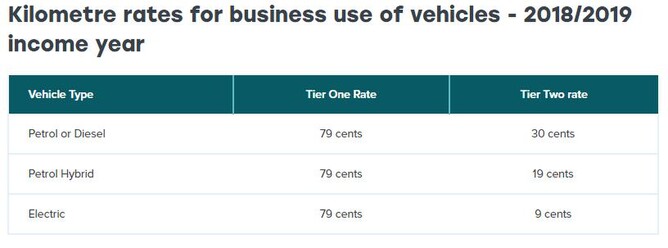If you have a vehicle that is only used for business, you can claim the full running costs as a business expense. If you use your vehicle for both business and personal trips you will need to work out how to allocate costs correctly.
There are two ways to do this – keeping a logbook or adding up the actual costs.
If your vehicle is petrol, diesel, hybrid or electric you can use either method. You need to continue to use one method for as long as you own the vehicle. If your vehicle isn’t petrol, diesel, hybrid or electric then you must use the actual costs method.
Logbook
You can keep a logbook to find out how much you usually use the vehicle for business. Use our kilometre rates to calculate the deduction for costs and depreciation for the business use of your vehicle.
When self-employed people use kilometre rates, GST does not need to be considered. Kilometre rates include depreciation. If you use this method you will not have a separate depreciation deduction or recovery of depreciation.
Using the Tier One and Tier Two rates
The Tier One rate is a combination of your vehicle's fixed and running costs. Use the Tier One rate for the business portion of the first 14,000 kilometres travelled by the vehicle in a year. This includes private use travel.
The Tier Two rate is for running costs only. Use the Tier Two rate for the business portion of any travel over 14,000kms in a year.
Using Tier One and Two rates for employee reimbursement
If you're an employer, you can use Tier One and Tier Two kilometre rates to get a reasonable estimate of expenditure. This will help reimbursing an employee who has business-related use of the vehicle.
Your employee will need a record showing their business-related use of the vehicle over the income year, such as a logbook. You then use it to calculate the exempt portion of reimbursement using the kilometre rates we've set. For example, use the Tier One rate for the business portion of the first 14,000 kms (total) travelled by the vehicle in the income year, and then the Tier Two rates after that.
Actual costs
You can keep track of the actual costs of running your vehicle and treat these as a business expense.
You need to keep accurate records including details of private and work-related expenses. These expenses could be buying petrol, getting a Warrant of Fitness, paying for maintenance, insurance, and parking. Your records need to show the reasons for all business travel, and the distances of all journeys.
You can also claim a deduction on any depreciation loss for the business use of your vehicle.
Check out the full article here




